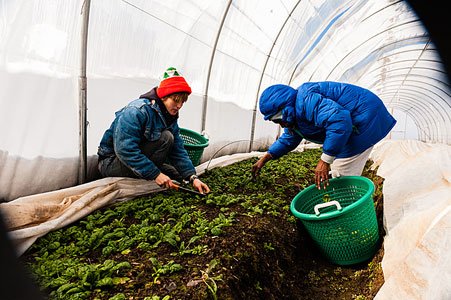BALTIMORE — With colder temperatures and wintry weather on the horizon, officials from the nonprofit Civic Works’ Real Food Farm program say they won’t slow down their efforts to improve neighborhood access to healthy food and develop Baltimore’s agriculture sector.
It’s also not the time to stop providing education to city students and finding ways to protect what many say is a debilitated nutritional environment.
“Real Food Farm is continuing urban farming efforts in Baltimore City despite cold temperatures and winter’s icy, snowy conditions,” Dana Stein, the executive director at Civic Works said in an email. “The Civic Works program will maximize efforts in winter months by growing produce that survives in frigid temperatures, including root vegetables and leafy greens, lettuce, kale, carrots, turnips and beets.”
Civic Works officials said the nonprofit has amplified its educational initiatives for the winter season, teaching volunteers the importance of agriculture, food access programs and infrastructure development to strengthen farm to table programs in urban environments.
“Farmers traditionally take off the winter after a long growing season, so it takes a strong will to trot out on the cold and wet days to keep farming,” said Tyler Brown, a farm manager of the Real Food Program for Civic Works.
“We want to utilize our smaller space at Civic Works Real Food Farm for as long as possible every year, which is often a theme for many urban farms.”
Taking some time off should be commended and being a farmer can be tough and farmers really deserve a break, according to Brown.
“Other than mentally staying focused through challenging weather, winter farming is quite easy, there are less weeds, fewer pests, longer window of opportunity for harvest, and fewer competitors in the market so there’s always a higher demand,” he said. “If you’re willing to push through cold, wet weather, it’s very rewarding. That being said, if you have produce that needs to be harvested for a specific destination the produce doesn’t care that it’s snowing outside.”
Real Food Farm’s Clifton Park site and farm office is located on the Lake Clifton High School Campus at 2801 St. Lo Drive. The program also enables fresh organic produce grown within Baltimore City to be delivered to various local restaurants.
Real Food Farm also seeks to provide a transparent and responsible soil management plan, to ensure high quality produce, safe working conditions and experiences for students and visitors, and a model for urban food production.
“There is still a lot of work to do to fix the broken food system, to support the communities in recovering from a history of racism and disinvestment, but we’re making progress,” Brown said. “We couldn’t do it without the amazing network of neighborhood organizations, farmers, city government, and volunteers.”
In conjunction with their Nutrient Management and Food Safety Plan, the program carefully monitors lead and other contaminants in the soil and plant tissue.
Brown said the program demonstrates a replicable and sustainable model that shows the potential for urban agriculture to boost Baltimore’s local economy.
“It’s fun to surprise people who expect our volunteer hours to disappear [during the winter], or who expect our crops to stop showing up at the farmer’s market,” Brown said. “We’re glad we can show the potential for the growing season to be year-round. It is possible to continue eating produce grown in Baltimore City in January. We make that happen, and it is rewarding and worth the effort.”
